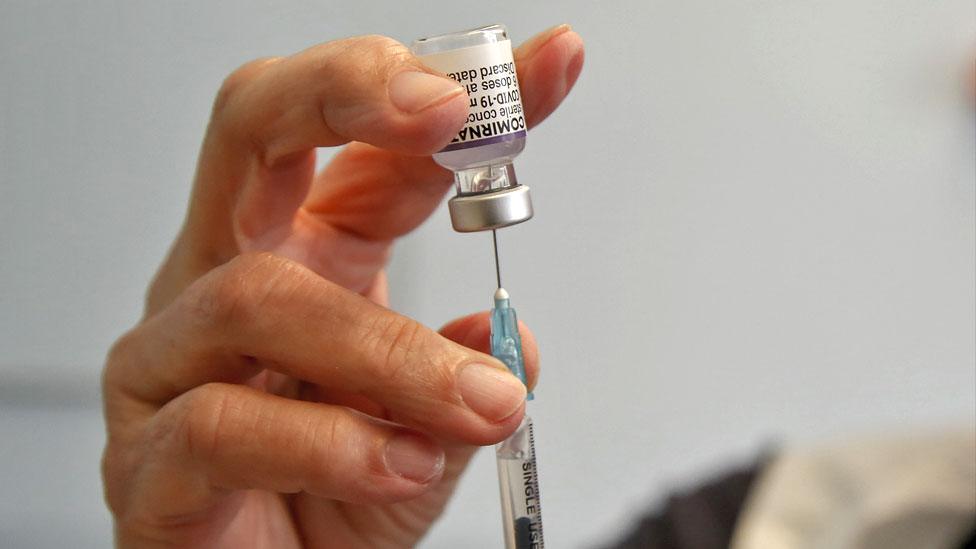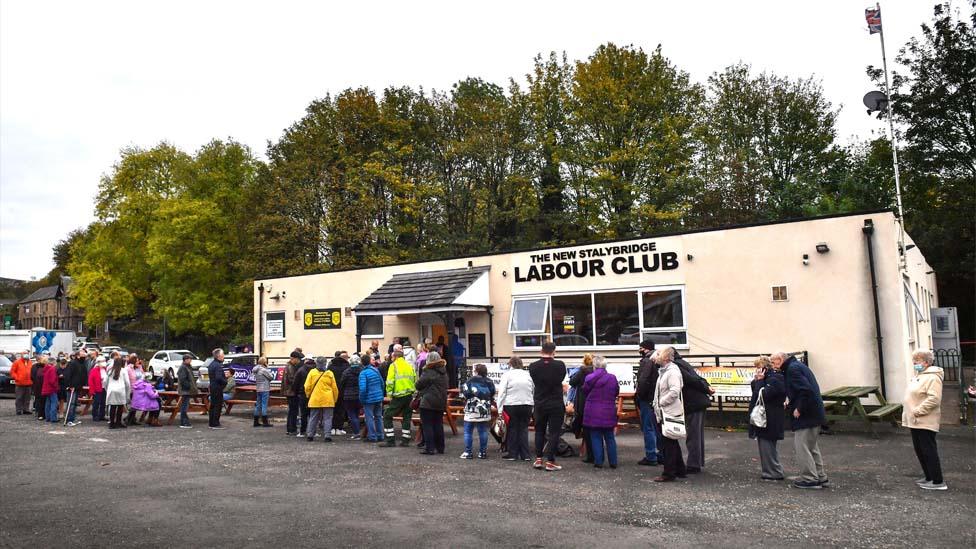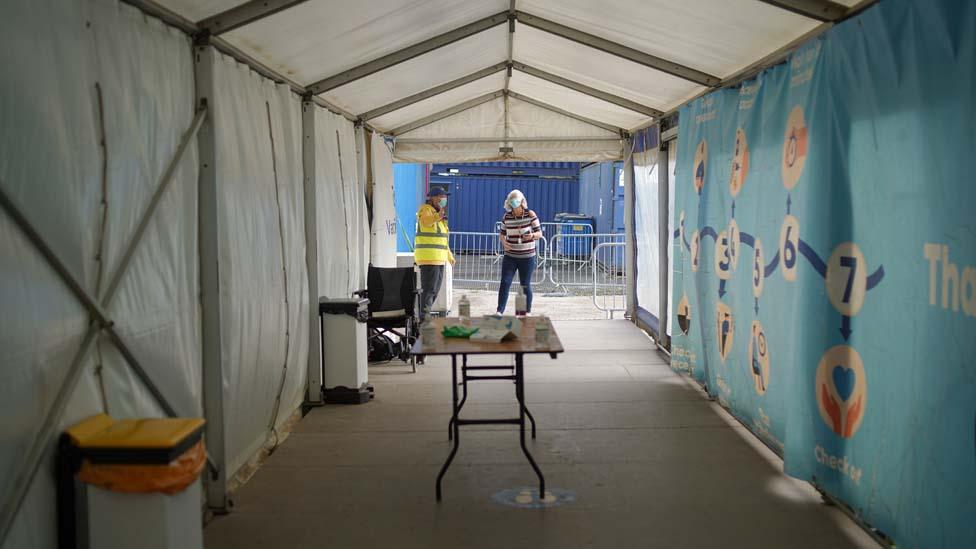Will complacency damage Covid booster rollout?
- Published
- comments

Around 8.4 million booster doses have been given across the UK to date, 7 million of those in England.
Booster vaccines are seen as the single most important way to control Covid as we head into the winter months. Critics though say the rollout of third jabs has been too slow, and a faster response could have saved hundreds of vulnerable lives already.
With life slowly returning to normal in the UK, and most restrictions lifted, here are some statistics that might seem surprising.
Over the last month, 4,409 people over 50 were admitted to English hospitals after testing positive for Covid - despite having two doses of a vaccine. And 2,148 men and women in that age group lost their lives.
The best way to protect the elderly and vulnerable this winter is, say government scientists, a booster programme. The third vaccine dose will eventually be offered to 30 million people over 50, medical staff, and younger adults with some health conditions.
From this week anyone eligible - six months after their second dose - can turn up at a walk-in centre to get their booster in England.
But doctors and others involved in the programme have told the BBC that they are still concerned about the speed of the rollout. The worry is that complacency, and changes to the way jabs are offered, could leave millions at greater risk of serious illness this Christmas.
5.8mpeople eligible for booster now, but not been jabbed
4,409over 50s hospitalised in England in Oct, despite being double vaccinated...
2,148doubled jabbed over 50s died
'Rapid delivery'
In June, health secretary Sajid Javid said the NHS was working to "rapidly deliver" booster doses as soon as scientific advisers gave the go-ahead.
Since September, more than seven million have received a third jab in England. The programme though has struggled to keep pace with the number hitting the six-month mark and becoming eligible.
Roughly 5.8 million people now qualify but have not yet been jabbed, according to John Roberts, from the Covid-19 Actuaries Response Group, which has been tracking the rollout, up from 2.8 million a month ago.
Allow X content?
This article contains content provided by X. We ask for your permission before anything is loaded, as they may be using cookies and other technologies. You may want to read X’s cookie policy, external and privacy policy, external before accepting. To view this content choose ‘accept and continue’.
"The worry is that, at the current rate, we're still not going to complete the priority groups until mid-January," he said.
"There are going to be people mixing over Christmas who haven't got that extra protection from the booster, which really does make a huge difference."
There has been similar criticism in Wales, Northern Ireland and Scotland, where First Minister Nicola Sturgeon recently said accelerating the rollout was now her government's "single most important", external priority.
'Waning' enthusiasm
People responsible for delivering the vaccine programme on the ground say there does appear to be less public enthusiasm for the third dose, particularly in the younger groups who qualify.
Some have already caught Covid and been double jabbed, so don't think they need another shot. Others may simply be less fearful of catching the virus.
"Personally I don't think the national [NHS] team has been clear enough in saying that two doses might not be enough," one local health official told the BBC.
There is some evidence that the protection from a Covid vaccine does fade or "wane" over time.

A study by Public Health England found that vaccine effectiveness against severe disease fell from 95% in the weeks after a second AstraZeneca dose to 77% after five months.
Flip that figure around and it means that the risk of someone who is double jabbed needing hospital treatment may already be five times higher now than in early summer.
The better news is that a booster dose appears to fix that problem very quickly.
A study published in October found that it slashed the rate of severe disease in Israel. A week after being given the third jab, a person's risk of needing hospital treatment was 93% lower than someone with similar characteristics, but only two shots.
"You rarely see such incredibly clear observations," said immunologist Andrew Croxford.
"I would expect absolutely the same thing to be happening in the UK. People who get a third dose will likely drop out of the hospital statistics in the same way as they have in Israel."

Queues form outside the New Stalybridge Labour Club in Manchester on 27 October as booster vaccines were given out.
'Extra complexity'
The original vaccine rollout felt like a real national effort in the middle of lockdown: vaccine buses were sent out, crowds queued outside sports centres, and volunteers were everywhere.
The bulk of those first jabs - about 75% - were given by GPs in England.
That was always going to be difficult to maintain this autumn, with doctors also having to deal with more everyday appointments and the flu shot.
Dr Martin Marshall, chairman of the Royal College of GPs, said a "significant number" of practices had to "step back" from the Covid programme, leading to "half as many GP vaccination sites" as before.
"Instead the government wants to see [the programme] delivered by mass centres and pharmacies. People trust their GPs, they know where to go."
Going online to find your nearest pharmacy "adds an extra layer of complexity".
About 50 larger mass vaccination centres across England have also closed since April, while others have reduced their hours.
Instead, NHS England has signed up another 825 pharmacies. The problem, said one health official, is that many of those are smaller premises which can only jab dozens a day - compared to 1,000 a day at a large GP surgery.

The Covid vaccine centre at Stithians Showground near Falmouth gave the last of its 135,000 doses in September, before operations were relocated to the Royal Cornwall Hospital.
Walk-in appointments
Ministers hope the launch of a walk-in service will soon start to make a difference.
Those who are eligible should now be able to go online,, external find a service nearby and turn up without an appointment in England.
There are still concerns though about whether that kind of system is best suited to the most vulnerable - often those without internet access or transport.
"It might be very effective as we move down the age groups but, at the moment, I suspect many still want to be contacted and told 'here is your appointment'," said Mr Roberts.
An NHS spokesperson said: "People can get their booster jab as soon as they become eligible in line with guidance - over the last week, a record 1.6 million boosters were delivered in England.
"It is vital people come forward as quickly as possible - there are appointments available and people can book in through the National Booking Service or use one of the hundreds of walk-in vaccination sites."
Follow Jim on Twitter, external.
Related topics
- Published2 April
